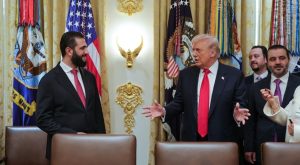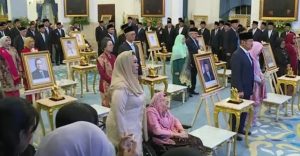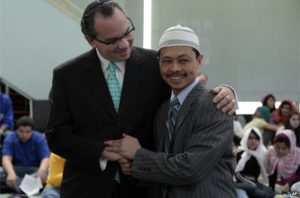By : Ali Farkhan Tsani, Senior Editor of MINA News Agency
Leadership for Muslims is very fundamental and basic. This can be seen from the lives of Muslims who were led by the Prophet sallallaahu ‘Alaihi Wasallam in the early days of Islam in the Arabian Peninsula. This phase lasts for 23 years, in Mecca (13 years) and in Medina (10 years).
After the prophethood, the leadership of the Muslims turned to the companions, who were known as the leadership who followed in the footsteps of the prophethood (Khilafah ‘Ala Minhajin Nubuwwah). In this phase, Muslims are led by Khulafaur Rashidin al-Mahdiyyin (the Caliphs who get the right guidance) on an ongoing basis. Starting from Caliph Abu Bakr Ash-Shiddq, Amirul Mu’minin Umar bin Khattab, Caliph Uthman bin Affan and Imaam Ali bin Abi Talib.
This period lasted about 30 years which lasted from 11-40 H/632-661 AD.
Also Read: The Forty-Four-Days of Glory: Azerbaijan’s Struggle for Justice and Peace
The Prophet sallallaahu ‘Alaihi Wasallam during his lifetime made a will to Muslims to stick to the Sunnah of the Prophet and the Sunnah of Khulafaur Rashidin Al-Mahdiyyin. (Hadith History of Ahmad from Irbad bin Sariyah).
However, because of the time span thousands of years ago since the time of the Prophet sallallaahu ‘Alaihi Wasallam and Khulafaur Rashidin Al-Mahdiyyin, various problems of the ummah, the invasion of Western culture and the condition of differences of opinion among Muslims themselves. So it is natural that the re-establishment of leadership in accordance with the prophethood has experienced various problems.
Islamic Leadership Center
Abul A’la Al-Maududi said, Khulafaur Rasyidin has provided an example of how to apply the rules of Muslim leadership according to the prophetic pattern that shows the truth.
Also Read: Palestine Solidarity Month: A Collective Movement for Al-Aqsa and Palestine’s Freedom
The central position of Muslim leadership has proven to be able to gather and unite the power of Muslims around the world. Including the social power and ability of Muslims, to uphold dawkah to elevate the religion of Allah (kalimatullah hiyal ‘ulya).
In a review of the Qur’an, Allah has made humans in his position as Khalifah so that they can use the gift according to Allah’s guidance. At the same time this shows that humans are not rulers or owners of themselves. But he is only the Caliph or representative of the true Owner, namely Allah. As stated in the Al-Quran Surah Al-Baqarah verse 30.
In Ibn Kathir’s Tafsir it is stated, the argument of this verse contains the obligation to appoint a Muslim leader (Khalifah) to decide matters that are disputed between humans and decide disputes between them.
Including helping people who are persecuted from the arbitrary treatment of wrongdoers, enforcing punishments, warning them from heinous acts, and other work that cannot be enforced except by the presence of an Imam (Khalifah).
Also Read: Hassan al-Turabi: A Controversial Thinker from Sudan
This is considering that something that is perfection for an obligatory case is also obligatory.
Wali Al-Fattaah in the book Khilafah ‘Ala Minhajin Nubuwwah (Pustaka Amanah, 2011) asserts that the existence of the Caliph or Imam is obligatory for Muslims. So a violation of this would mean an anarchy, a singular act of which there is no example, each group claiming to be the most righteous.
According to him, currently anarchism is not only happening in the midst of the Muslim community. However, it has spread to countries where the majority of Muslims are inhabited. At one point they got along with each other. But at other times they go their separate ways.
Muslims are described as human mounds without a leader. Claiming to be Muslim but never controlling his steps. Whereas the existence of a leader for Muslims is mandatory as long as there are Muslims on this earth.
Also Read: Who Exactly is the RSF Group Shaking Sudan?
So, the problem of Muslim leadership is a very fundamental problem, because it includes the issue of Islamic principles and Muslims.
There is no people without a leader and there is no leader without people behind him.
Back to Al-Quran and As-Sunnah
Now if Muslims want to return to glory, lead world civilization and enforce Allah’s law on this earth, the condition is absolutely mandatory to return to the Qur’an and the Sunnah of the Prophet Muhammad sallallaahu ‘alaihi wasallam.
Also Read: The Two-State Solution (Palestine–Israel) in Historical Perspective
This is a typical answer for Muslims, and if there is a dispute and difference, then the return is to Allah and His Messenger, above the Qur’an and the Sunnah of the Prophet.
Allah confirms in His word, which means: “O you who believe! Obey Allah and obey the Messenger (Muhammad), and Ulil Amri (holders of power) among you. Then, if you disagree about something, then return it to Allah (the Quran) and the Messenger (His Sunnah), if you believe in Allah and the Last Day.” (Surah An-Nisa/4:59).
Finally, while maintaining ukhuwah Islamiyyah in the midst of the diverse conditions of Muslims, let us continue to close the lines of struggle, maintain mutual communication and brotherly relations among the Muslim community.
Thus, God willing, Muslims will be able to unite, so that the central leadership of Muslims is re-realized which follows the Prophetic pattern, as instructed by the Prophet sallallaahu ‘Alaihi Wasallam and has been practiced by Khulafaur Rashidin Al-Mahdiyyin, Amen. (T/RE1)
Also Read: Enchanted by K-Dramas, Dragged into Slander: Time for Muslims to Rise!
Mi’raj News Agency (MINA)






































 Mina Indonesia
Mina Indonesia Mina Arabic
Mina Arabic